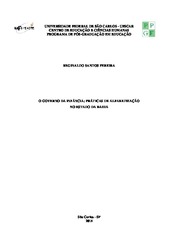| dc.contributor.author | Pereira, Reginaldo Santos | |
| dc.date.accessioned | 2016-06-02T19:36:01Z | |
| dc.date.available | 2015-05-11 | |
| dc.date.available | 2016-06-02T19:36:01Z | |
| dc.date.issued | 2015-02-27 | |
| dc.identifier.citation | PEREIRA, Reginaldo Santos. O governo da infância: práticas de alfabetização no Estado da Bahia. 2015. 198 f. Tese (Doutorado em Ciências Humanas) - Universidade Federal de São Carlos, São Carlos, 2015. | por |
| dc.identifier.uri | https://repositorio.ufscar.br/handle/ufscar/2369 | |
| dc.description.abstract | This study aimed to analyze how the curricular system present in a literacy proposal governs and produces children's subjectivities in the early years of elementary school in the state of Bahia. The survey was conducted based on the analysis of the Covenant Program for Education (PPE) established in 2012 by Bahia s Secretariat of Education in municipal and state schools of participant municipalities. The PPE s documents analyzed are: the Didactic Proposal for Literacy, the book of children's stories It seems to be... but it is not, the Activity Book and the kit of teaching materials. As a methodological tool we used the arqueogenealogy of Michel Foucault, with the aim of understanding the relations between knowledge and power that surround the discursive and non-discursive practices which produce forms of subjectivity in both reading and writing activities, as in children's literature. The research results revealed that the curricular structure of the analyzed documents acts as a device of knowledge, power, and subjectivity and it is based on the constructivist theoretical frameworks of the Written Language Psychogenesis. The literacy practice is also based on the stories of children's literature, which play the role of taming the imaginary, producing disciplinary and subjective effects on children. Therefore, the process of childhood governmentalisation underway in the state of Bahia discursively produces an essentialist, disciplined, stagiest and normalized childhood. Finally, the study sought to weave itineraries that allow to question and to expand the knowledge about literacy, curriculum, and the arts of governing childhood. | eng |
| dc.format | application/pdf | por |
| dc.language | por | por |
| dc.publisher | Universidade Federal de São Carlos | por |
| dc.rights | Acesso Aberto | por |
| dc.subject | Alfabetização | por |
| dc.subject | Currículos | por |
| dc.subject | Governo | por |
| dc.subject | Infância | por |
| dc.subject | Curriculum | eng |
| dc.subject | Literacy | eng |
| dc.subject | Government | eng |
| dc.subject | Childhood | eng |
| dc.title | O governo da infância: práticas de alfabetização no Estado da Bahia | por |
| dc.type | Tese | por |
| dc.contributor.advisor1 | Dinis, Nilson Fernandes | |
| dc.contributor.advisor1Lattes | DINIS, N. F. | por |
| dc.description.resumo | Este estudo teve como objetivo analisar como o dispositivo curricular manifesto em uma proposta de alfabetização governa e produz as subjetividades infantis nos anos iniciais do ensino fundamental no estado da Bahia. A pesquisa foi realizada a partir da análise do Programa Pacto pela Educação (PPE) instituído no ano de 2012 pela Secretaria de Educação do estado da Bahia nas escolas municipais e estaduais dos municípios conveniados. Os documentos analisados do PPE são: a Proposta Didática para Alfabetizar Letrando, o livro de histórias infantis Parece... mas não é, o Caderno de Atividades e o kit de materiais didáticos. Como ferramenta metodológica utilizamos a arqueogenealogia de Michel Foucault, com vistas à compreensão das relações de saber e poder que circundam as práticas discursivas e não discursivas que produzem modos de subjetivação tanto nas atividades de leitura e escrita, quanto na literatura infantil. Os resultados da investigação revelaram que a estrutura curricular dos documentos analisados atua como um dispositivo de saber, poder, subjetivação e fundamenta-se nos referenciais teóricos construtivistas da Psicogênese da língua escrita. A prática alfabetizadora ancora-se também nas histórias da literatura infantil, que cumprem o papel de domesticar o imaginário, produzindo efeitos disciplinares e de subjetivação do infantil. Portanto, o processo de governamentalização da infância em marcha no estado da Bahia produz discursivamente uma infância essencialista, disciplinarizada, etapista e normalizada. Por fim, o estudo buscou tecer itinerários que possibilitem a problematização e ampliação dos conhecimentos acerca da alfabetização, do currículo e das artes de governar a infância. | por |
| dc.publisher.country | BR | por |
| dc.publisher.initials | UFSCar | por |
| dc.publisher.program | Programa de Pós-Graduação em Educação - PPGE | por |
| dc.subject.cnpq | CIENCIAS HUMANAS::EDUCACAO | por |
| dc.contributor.authorlattes | http://lattes.cnpq.br/6548838603242766 | por |
